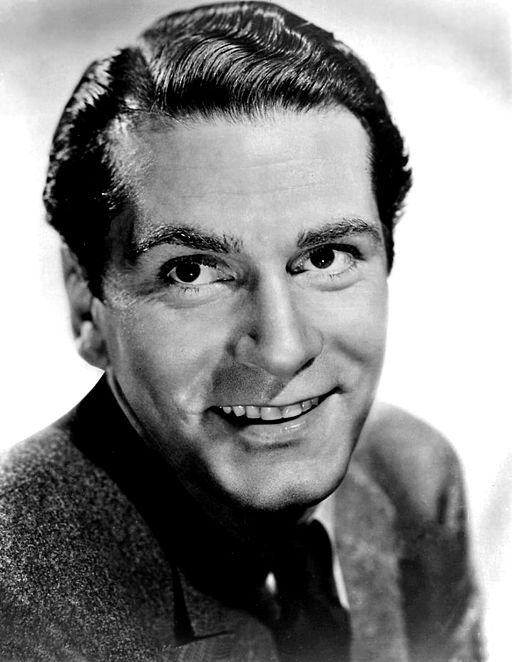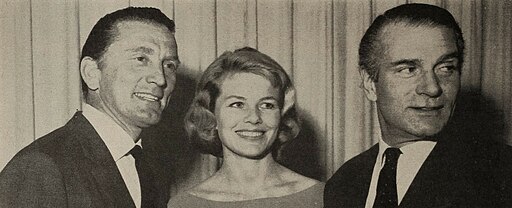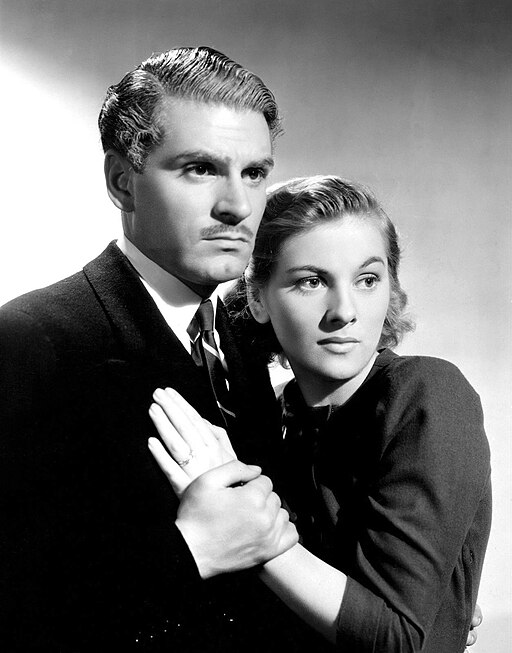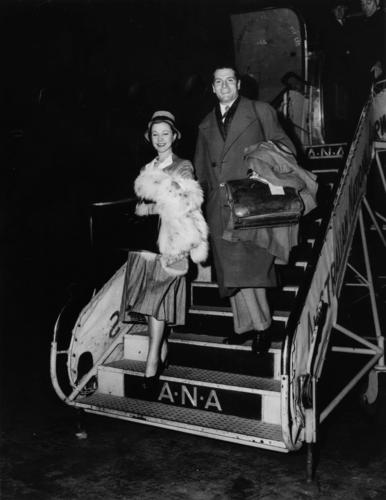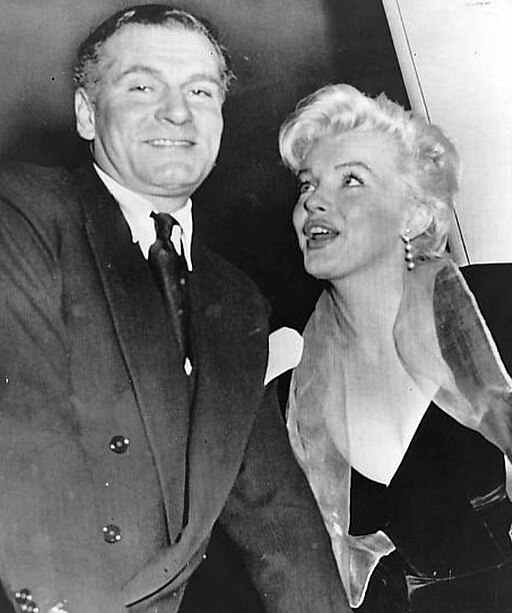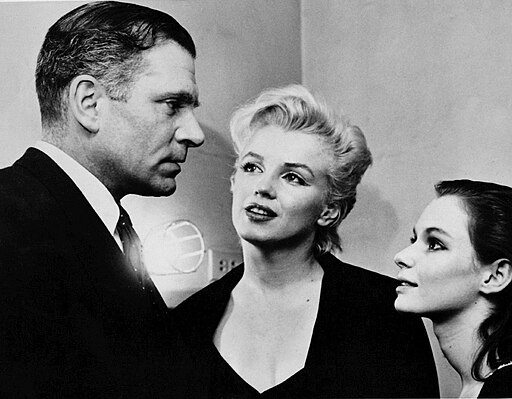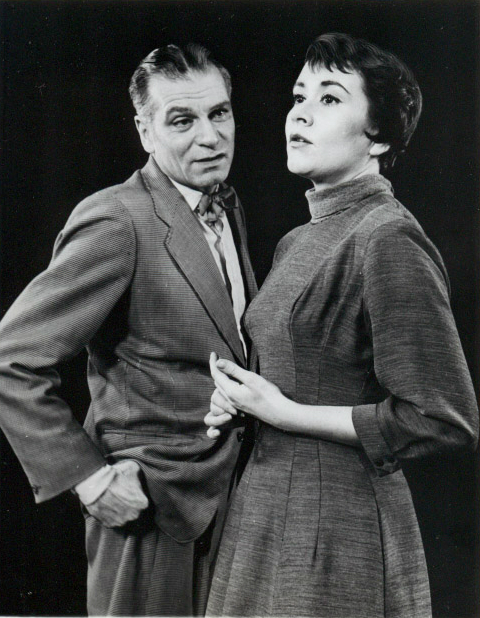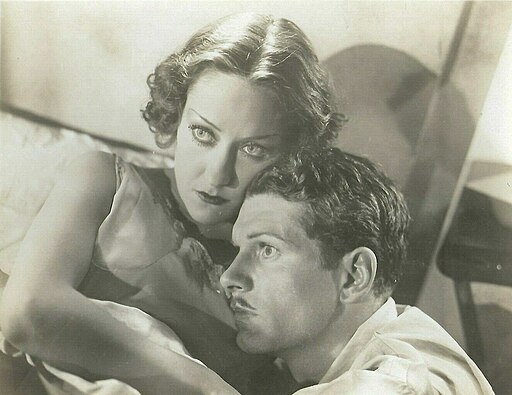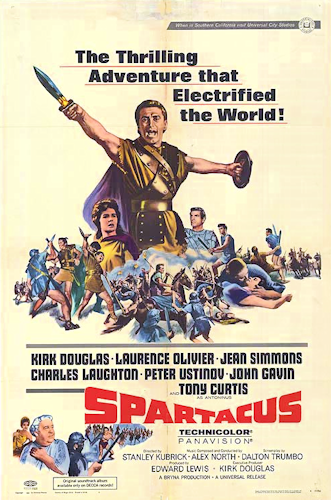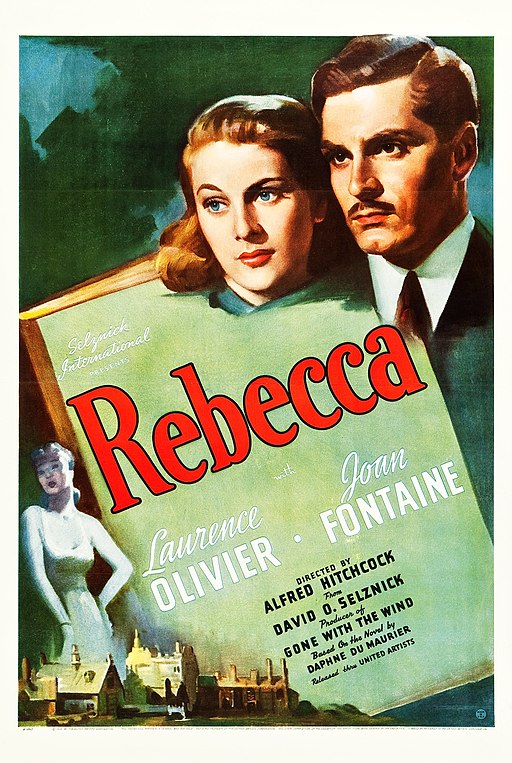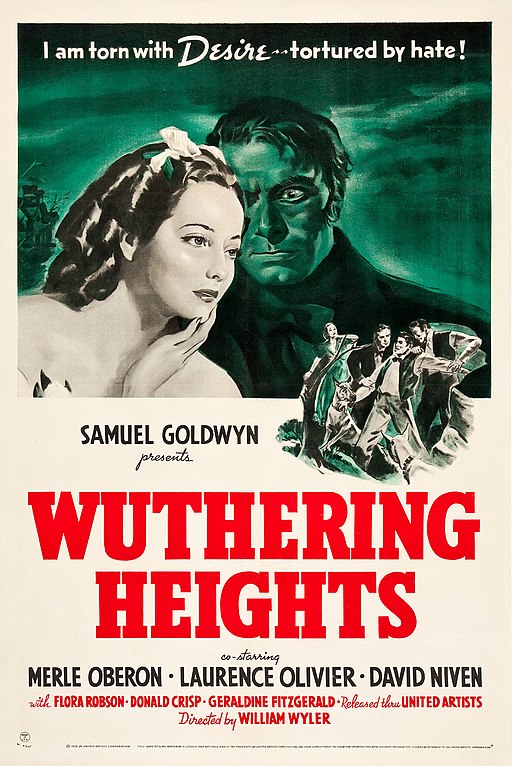Laurence Olivier
back| Full Name | Laurence Kerr Olivier |
| Stage Name | Laurence Olivier |
| Born | May 22, 1907 |
| Birthplace | Dorking, Surrey, England |
| Died | July 11, 1989 |
| Buried | Westminster Abbey, London, England. His ashes are interred in the Actors' Chapel in the South Transept. |
| Married to | Jill Esmond (1930 - 1940) - Vivien Leigh (1940 - 1960) - Joan Plowright (1961 - 1989) |
| Children | Tarquin Olivier (with Jill Esmond) - Richard Olivier (with Vivien Leigh) - Tamsin Olivier & Julie-Kate Olivier (with Joan Plowright) |
| Notable films | Wuthering Heights (1939) - Rebecca (1940) - Henry V (1944) - Hamlet (1948) - Othello (1965) - Sleuth (1972) |
Laurence Olivier
“Lord Olivier” – Titan of Stage and Screen
Laurence Olivier is often regarded as one of the greatest actors of the 20th century, renowned for his mastery of Shakespearean roles both on stage and in film. He began his acting career in the 1920s, quickly gaining acclaim for his versatility and intense method of acting. Olivier's talent spanned across both the classical and modern repertoires.
Olivier's contributions to theatre are immense. He was instrumental in the establishment of the National Theatre in London and served as its first director from 1963 to 1973. His directorial work is as acclaimed as his acting, with a keen eye for detail and an innovative approach to staging classic plays.
His marriage to Vivien Leigh, one of the most famous acting couples of the time, brought both personal and professional collaborations. They starred together in several productions, both on stage and screen.
Related
Laurence Olivier
Biography and Analysis of his work
Early Years
- Born: May 22, 1907, in Dorking, Surrey, England.
- Family Background: Olivier was the youngest of three children. His father, a strict High Anglican priest, and his mother, who died when he was just twelve, significantly influenced his early life.
- Education: Olivier attended St Edward's School, Oxford, where he discovered his passion for drama. He later studied at the Central School of Speech and Drama in London.
Path Towards Success
- Early Career: Olivier's stage career began in 1922 with the Birmingham Repertory Company. His charisma and intensity quickly made him a standout performer.
- Rise to Prominence: He joined the Old Vic Company in 1937, where his performances in Shakespearean roles made him a national figure. His portrayal of Hamlet at the Old Vic in 1937 was a critical and popular success, setting the stage for his future triumphs.
- Hollywood Career: Olivier transitioned to Hollywood, making a significant impact with films like "Wuthering Heights" (1939) and "Rebecca" (1940). His ability to bring depth to both romantic and complex characters was widely praised.
Marriages and Personal Life
- Jill Esmond (1930–1940): His first marriage was to actress Jill Esmond. They had one son, Tarquin.
- Vivien Leigh (1940–1960): His second marriage, to actress Vivien Leigh, was highly publicized. Their turbulent relationship was marked by mutual passion for theatre and Leigh's struggle with mental illness.
- Joan Plowright (1961–1989): His marriage to Joan Plowright, with whom he had three children, was more stable and lasted until his death.
Passions and Achievements
- Theatre Work: Olivier's greatest passion was the theatre. He was instrumental in founding the National Theatre in London and served as its first director.
- Shakespearean Roles: His portrayals of Shakespearean characters are legendary, with performances in "Hamlet," "Othello," and "Richard III" considered some of the best ever.
- Awards and Honors: Olivier was knighted in 1947 and later made a life peer in 1970. He received multiple awards, including several Academy Awards and BAFTAs.
Death and Legacy
- Cause of Death: Olivier died of renal failure on July 11, 1989, at the age of 82.
- Final Years: Despite his failing health in later years, Olivier continued to act, displaying an unyielding dedication to his craft.
- Legacy: Olivier's influence on theatre and film is profound. He is remembered for his innovative approaches to acting and directing, particularly in Shakespearean drama. His contributions to the arts made him not just a celebrated actor but a cultural icon.
Laurence Olivier's life was marked by intense dedication to his art, complex personal relationships, and a lasting impact on the performing arts. His story is one of extraordinary talent, professional triumphs, personal challenges, and an enduring legacy in the world of theatre and film.
Memorable Quotes from Laurence Olivier:
On Acting and Theater:
- "The actor should be able to create the universe in the palm of his hand."
- "I take a simple view of life: keep your eyes open and get on with it."
- "Without acting, I cannot breathe."
On Shakespeare and Classical Roles:
- "In my work, I have learned that a clear head and a deep understanding are not worth a damn unless you have the animal instinct to go for the throat of the part and play it to the hilt."
- "Shakespeare - The nearest thing in incarnation to the eye of God."
On Personal Growth and Experience:
- "I believe that in a great city, or even in a small city or a village, a great theater is the outward and visible sign of an inward and probable culture."
- "Have a very good reason for everything you do."
On the Essence of Drama:
- "Work is life for me, it is the only point of life – and with it, there is almost always the possibility of what I think of as ‘the breakthrough.’"
- "The office of drama is to exercise, possibly to exhaust, human emotions. The purpose of comedy is to tickle our affections, our derision, or our vanity; the purpose of tragedy is to wound our hearts and make us feel."
Reflecting on Life and Legacy:
- "If I wasn't an actor, I think I'd have gone mad. You have to have extra voltage, some extra temperament to reach certain heights. Art is an extra life. It's not part of survival; it's an extra burst of life, and it's for its own sake."
Notable Movies featuring Laurence Olivier:
1930s
- 1939: "Wuthering Heights"
- Synopsis: Olivier played Heathcliff in this classic adaptation of Emily Brontë's novel, portraying the tormented lover in a story of passionate and tragic love.
1940s
- 1940: "Rebecca"
- Synopsis: In this Alfred Hitchcock film, Olivier plays Maxim de Winter, a widower tormented by the memory of his deceased wife.
- 1941: "That Hamilton Woman"
- Synopsis: Olivier starred as Lord Horatio Nelson in this historical drama about the British naval hero's affair with Lady Emma Hamilton.
- 1944: "Henry V"
- Synopsis: Olivier directed and starred in this adaptation of Shakespeare's play, delivering a rousing portrayal of the English king.
- 1948: "Hamlet"
- Synopsis: In another directorial effort, Olivier also starred as the brooding Prince of Denmark in this acclaimed Shakespeare adaptation.
1950s
- 1955: "Richard III"
- Synopsis: Olivier directed and played the title role in this adaptation of Shakespeare's play, portraying the manipulative and power-hungry king.
- 1957: "The Prince and the Showgirl"
- Synopsis: This romantic comedy featured Olivier as a prince who falls for a showgirl, played by Marilyn Monroe.
1960s
- 1960: "Spartacus"
Synopsis: In this epic historical drama, Olivier played the Roman general Crassus, a key figure in the slave revolt led by Spartacus.
- 1965: "Othello"
Synopsis: Olivier received praise for his powerful performance as Shakespeare's tragic Moorish general.
1970s
- 1972: "Sleuth"
Synopsis: In this mystery thriller, Olivier played a wealthy writer who engages in a battle of wits with a young man, played by Michael Caine.
- 1976: "Marathon Man"
Synopsis: In this thriller, Olivier portrayed a Nazi war criminal involved in a deadly game of cat-and-mouse with a graduate student.
1980s
- 1981: "Brideshead Revisited"
Synopsis: In this television miniseries, Olivier played Lord Marchmain, reflecting the changes in British aristocracy through the early 20th century.
- 1983: "King Lear"
Synopsis: Olivier's portrayal of the tragic king in Shakespeare's play was a television event, showcasing his enduring mastery of classical roles.
Laurence Olivier receives an Honorary Oscar
Watch the Award ceremony:
Analysis of Laurence Olivier’s Acting Style:
Laurence Olivier's acting style is renowned for its depth, versatility, and intensity, making him one of the most celebrated actors of the 20th century. Here's an analysis of key aspects of his style:
Classical Training and Technique
Olivier was rigorously trained in classical theatre, which formed the backbone of his acting style. This grounding in the classics gave him a robust command of language, particularly evident in his Shakespearean roles.
Physicality and Voice
His performances were noted for their physicality. Olivier could use his body expressively to convey emotion or character traits.
His voice was another powerful tool. He had a remarkable range and could modulate his voice to suit various characters, from the regal tones of kings to the menacing whispers of villains.
Psychological Depth
Olivier brought a psychological complexity to his roles. He delved deeply into the minds of his characters, portraying nuanced emotions and motivations. His Hamlet, for instance, was both brooding and vulnerable, bringing out the existential angst of the character.
Method Acting Influences
Although primarily trained in classical theatre, Olivier was also influenced by Method acting. He incorporated some of its techniques, like drawing on personal emotions, to add realism and intensity to his performances.
Adaptability and Range
Olivier was adept at both tragedy and comedy, as well as a range of genres from historical epics to modern dramas. This adaptability showcased his broad range as an actor.
Innovative Interpretations
He was known for his innovative interpretations of classic roles. His approach often brought new insights and perspectives to well-known characters, keeping them fresh and relevant.
Integration of Acting and Directing
As a director, Olivier had a keen understanding of how acting fits within the broader context of the production. This allowed him to create performances that were cohesive with the visual and thematic elements of the film or play.
Influence and Legacy
Olivier's style influenced generations of actors. His mastery of both stage and screen acting set a standard for others to follow.
Criticism
For all the praise, Olivier's style was not without criticism. Some critics argued that his approach could be overly theatrical or mannered, particularly in his later years.
Evolution Over Time
Olivier's style evolved over his career. While his earlier performances were marked by a certain flamboyance, his later work became more understated, reflecting a mature understanding of character and narrative.
In summary, Laurence Olivier's acting style was a blend of classical training, psychological depth, physical expressiveness, and innovative interpretation. His ability to adapt to various genres and roles, combined with his integration of acting and directing, established him as a towering figure in the world of acting.
Trivia of Laurence Olivier:
Height:
Laurence Olivier's height was reported to be approximately 5 feet 10 inches (178 cm).
Laurence Olivier Award for Best Performance in a Supporting Role:
The Laurence Olivier Award for Best Performance in a Supporting Role is a prestigious accolade presented annually by The Society of London Theatre as part of the Laurence Olivier Awards. These awards, established in 1976 and named after the celebrated actor Laurence Olivier, are recognized as some of the highest honors in British theatre. They celebrate outstanding achievements in professional theatre in London, akin to the Tony Awards in the United States.
Key Aspects of the Award:
- Categories: The award initially recognized performers in both plays and musicals in a single category. However, it was eventually divided to separately honor performances in plays and musicals.
- Criteria: The award is given to an actor or actress in a supporting role, acknowledging exceptional performances in either a play or a musical staged in London's West End.
- Significance: Winning or being nominated for an Olivier Award is a mark of high prestige, often signifying exceptional talent and contribution to the theatrical arts.
Impact:
- Career Influence: Actors who receive this award often see a significant boost in their careers, as it highlights their talent and dedication to the craft.
- Recognition of Talent: The award brings attention to the vital role of supporting actors in theatrical productions, who, while not in leading roles, significantly contribute to the success and depth of a performance.
Recent Developments:
- Over the years, the categories and criteria of the Olivier Awards have evolved, reflecting changes in the theatre industry and the need to acknowledge a diverse range of talents and production types.
Awards and Nominations:
Academy Awards (Oscars)
Winner:
- Best Actor for "Hamlet" (1949)
- Honorary Award for his outstanding achievements as actor, producer and director (1979)
Nominated:
- Best Actor for "Henry V" (1946)
- Best Actor for "Richard III" (1956)
- Best Actor for "The Entertainer" (1960)
- Best Picture for "Richard III" (1956, as producer)
- Best Director for "Hamlet" (1949)
- Best Director for "Richard III" (1956)
- Best Actor for "Othello" (1965)
- Best Actor for "Sleuth" (1973)
- Best Supporting Actor for "Marathon Man" (1977)
- Best Actor for "The Boys from Brazil" (1979)
British Academy Film Awards (BAFTA)
Winner:
- Best British Actor for "Richard III" (1957)
- Academy Fellowship (1984)
Nominated:
- Best British Actor for "Othello" (1966)
- Best Actor for "Sleuth" (1973)
Emmy Awards
Winner:
- Outstanding Lead Actor in a Limited Series or a Special for "Long Day's Journey Into Night" (1987)
- Outstanding Lead Actor in a Limited Series or a Special for "Love Among the Ruins" (1975)
- Outstanding Lead Actor in a Limited Series or a Special for "Brideshead Revisited" (1982)
Nominated:
- Outstanding Lead Actor in a Limited Series or a Special for "King Lear" (1984)
Golden Globe Awards
Winner:
- Best Actor – Motion Picture Drama for "Spartacus" (1961)
- Best Actor – Motion Picture Drama for "Othello" (1966)
- Best Actor – Motion Picture Drama for "Marathon Man" (1977)
- Best Supporting Actor – Series, Miniseries or Television Film for "War Requiem" (1989)
Nominated:
- Various other nominations over the years
Other Honors and Awards
- Knighted: Olivier was knighted in 1947, becoming Sir Laurence Olivier.
- Life Peerage: In 1970, he was made a life peer as Baron Olivier of Brighton.
- National Theatre: Olivier was the founding director of the National Theatre in London and greatly contributed to its success.
- Other Honorary Awards: Olivier received numerous honorary degrees, distinctions, and lifetime achievement awards from various international organizations and institutions.
Festivals and Special Recognitions
- Olivier's work was celebrated at various film festivals and by film societies around the world. He was often honored for his lifetime contributions to the arts.
Significance of Olivier’s Performance in “Rebecca”:
Laurence Olivier's role in "Rebecca" (1940), directed by Alfred Hitchcock, was highly significant for several reasons, both in terms of his career development and his standing in Hollywood:
Transition to Hollywood Stardom
By the time "Rebecca" was released, Olivier was already a respected stage actor and had made several films in Britain. However, "Rebecca" marked a significant transition for him into mainstream Hollywood cinema. This film helped to cement his status as a leading man in American movies.
Collaboration with Alfred Hitchcock
Working with Hitchcock, one of the most influential directors in cinema history, was a major milestone. Hitchcock's mastery of suspense and his style were influential, and his collaboration with Olivier contributed to the film's critical and commercial success.
Critical Acclaim and Commercial Success
"Rebecca" was both a critical and commercial success. It won the Academy Award for Best Picture and received 11 Oscar nominations in total, including a Best Actor nomination for Olivier. This success boosted Olivier's profile in Hollywood significantly.
Artistic Growth
Olivier's role as Maxim de Winter showcased his ability to convey complex emotions and a deep sense of inner turmoil, adding a layer of psychological depth to the film. This role demonstrated his versatility as an actor, capable of transitioning from Shakespearean stage roles to complex characters in modern cinema.
Establishing a Screen Persona
In "Rebecca," Olivier crafted a screen persona that blended his theatrical background with the subtleties required for film acting. His portrayal of Maxim de Winter—a brooding, troubled, yet charismatic figure—became a template for some of his later roles.
Influence on Future Roles
The success of "Rebecca" led to more opportunities in Hollywood for Olivier, paving the way for roles in other major films like "Pride and Prejudice" (1940), "Wuthering Heights" (1939), and later "Hamlet" (1948), for which he won an Oscar.
Personal Life
During this period, Olivier's personal life was also in the spotlight, particularly his relationship with Vivien Leigh. Their high-profile romance and subsequent marriage added to his celebrity status.
Conclusion
"Rebecca" was a pivotal film in Laurence Olivier's career, marking his successful transition to Hollywood and establishing him as a major film star. The role played a significant part in shaping his future career and contributed to his legacy as one of the greatest actors of his time.
Full list of Movies featuring Laurence Olivier:
1930s
- 1930: "The Temporary Widow"
- 1931: "Friends and Lovers"
- 1931: "The Yellow Ticket"
- 1932: "Westward Passage"
- 1933: "No Funny Business"
- 1933: "Perfect Understanding"
- 1933: "I Was a Spy"
- 1934: "The Broken Melody"
- 1935: "Moscow Nights"
- 1936: "As You Like It"
- 1936: "Conquest of the Air"
- 1937: "Fire Over England"
- 1937: "21 Days"
- 1938: "The Divorce of Lady X"
- 1939: "Wuthering Heights"
- 1939: "Q Planes"
1940s
- 1940: "Pride and Prejudice"
- 1940: "Rebecca"
- 1941: "That Hamilton Woman"
- 1944: "Henry V"
- 1946: "The Chronicle History of King Henry the Fift with His Battell Fought at Agincourt in France" (alternative title for "Henry V")
- 1948: "Hamlet"
- 1949: "The Third Man" (voice only)
1950s
- 1951: "Carrie"
- 1952: "The Beggar's Opera"
- 1953: "The Magic Box" (cameo)
- 1955: "Richard III"
- 1957: "The Prince and the Showgirl"
- 1959: "The Devil's Disciple"
1960s
- 1960: "Spartacus"
- 1960: "The Entertainer"
- 1962: "Term of Trial"
- 1965: "Othello"
- 1966: "Bunny Lake Is Missing"
- 1966: "Khartoum"
- 1968: "The Shoes of the Fisherman"
- 1969: "Oh! What a Lovely War"
- 1969: "The Dance of Death"
1970s
- 1970: "Three Sisters"
- 1972: "Lady Caroline Lamb"
- 1972: "Sleuth"
- 1973: "Love Among the Ruins" (TV Movie)
- 1976: "Marathon Man"
- 1978: "The Betsy"
- 1978: "A Little Romance"
- 1978: "The Boys from Brazil"
- 1979: "Dracula"
1980s
- 1981: "Inchon"
- 1981: "Brideshead Revisited" (TV Series)
- 1981: "Clash of the Titans"
- 1982: "The Ebony Tower" (TV Movie)
- 1983: "King Lear" (TV Movie)
- 1984: "The Last Days of Pompeii" (TV Mini-Series)
- 1984: "A Voyage Round My Father" (TV Movie)
- 1984: "The Jigsaw Man"
- 1985: "Wild Geese II"
- 1985: "Lost Empires" (TV Mini-Series)
- 1986: "Peter the Great" (TV Mini-Series)
- 1988: "War Requiem"

